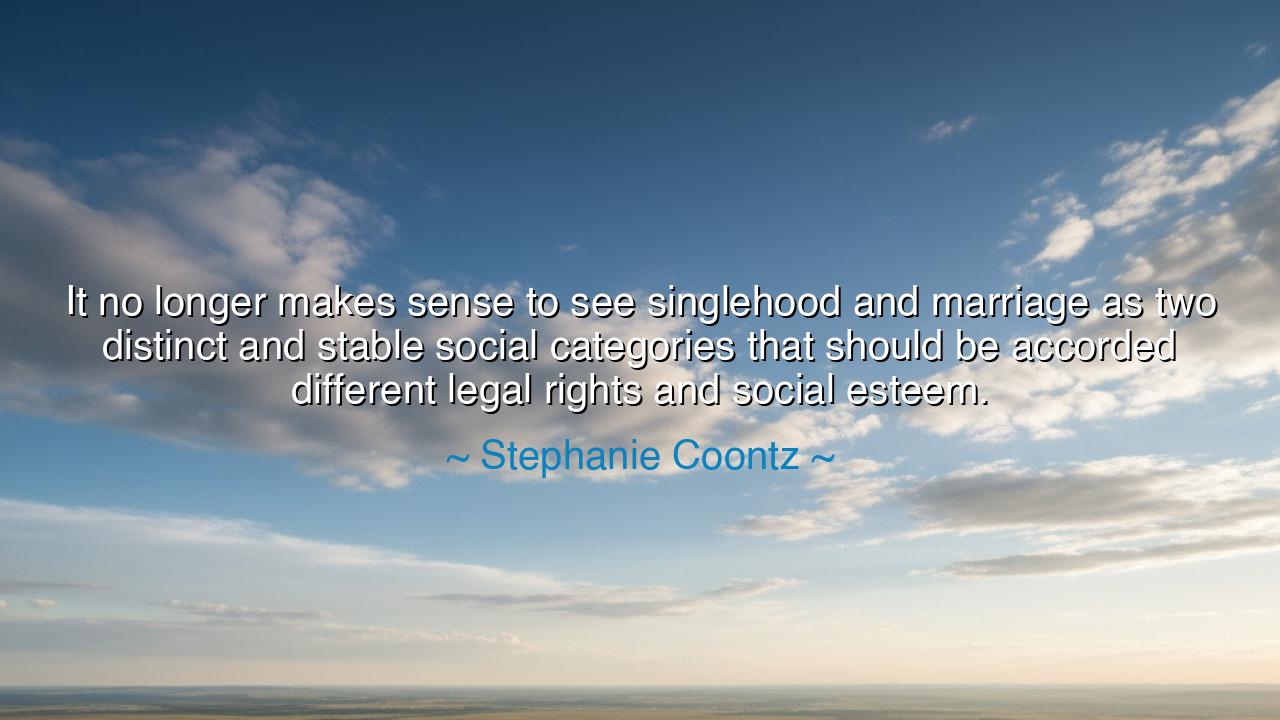
It no longer makes sense to see singlehood and marriage as two
It no longer makes sense to see singlehood and marriage as two distinct and stable social categories that should be accorded different legal rights and social esteem.






“It no longer makes sense to see singlehood and marriage as two distinct and stable social categories that should be accorded different legal rights and social esteem.” Thus spoke Stephanie Coontz, the wise chronicler of love and family, a historian who has dedicated her life to unveiling the hidden truths behind our most sacred institutions. In this statement, she casts her gaze upon one of the oldest divisions of human society—the line drawn between the married and the unmarried—and declares that the time has come to erase it. Her words carry not rebellion, but renewal; not defiance, but awakening. She speaks to a world that has changed, yet still clings to the remnants of old hierarchies, reminding us that dignity is not the privilege of marital status, but the birthright of all souls.
Stephanie Coontz, known for her seminal works on the history of marriage, has spent decades studying how families and relationships have evolved across the ages. Her quote arises from that deep well of knowledge—a recognition that what once defined social worth no longer serves the reality of modern life. In ancient times, marriage was not simply a union of love but a contract of power: it dictated property, inheritance, and social legitimacy. Those who remained single—especially women—were often cast aside, seen as incomplete or lacking purpose. Yet Coontz reminds us that in our age, such divisions are illusions. The human heart, the mind, and the capacity for contribution are not bound by rings or vows. To cling to those categories is to mistake the shadows of history for the light of truth.
Her declaration is not a dismissal of marriage, but a call to balance and fairness. For centuries, marriage was exalted as the highest form of social achievement, while singleness was treated as a lesser state, one to be pitied or corrected. But Coontz sees the shifting tides: more people now choose independence, not from bitterness, but from self-awareness and purpose. Many craft communities beyond the boundaries of romantic partnership—friends, neighbors, and chosen families that offer love as deep and loyal as any wedlock. Her words ask us to see that singlehood is not solitude, but another expression of the human spirit’s yearning to live fully and freely.
In the days of ancient Rome, the Emperor Augustus passed laws that punished those who remained unmarried, fearing that society would collapse without the bonds of wedlock. Yet centuries later, it was the monks and nuns—those who vowed never to marry—who preserved knowledge, tended the sick, and built the foundations of civilization anew. History thus bears witness to Coontz’s truth: that greatness, compassion, and virtue have never been confined to the married or the single, but flow from the integrity of the individual soul. Whether bound in partnership or standing alone, each person’s worth lies not in social status, but in the life they build and the love they give.
The legal inequalities Coontz speaks of still persist in many lands. Tax codes, healthcare access, inheritance laws—these often favor the married, assuming that dependence within a couple is the natural order of life. But what of the teacher who devotes her life to her students, the man who cares for his aging parents, the friend who stands as family to those who have none? Should they not also be honored, protected, and respected by society? Coontz’s insight pierces the heart of modern justice: the law must evolve to reflect not only what families once were, but what they are now becoming. In her vision, love is no longer defined by form, but by function—by care, by responsibility, by connection.
Her message is also deeply spiritual. She speaks to the essence of equality: that no person’s life should be measured by the presence or absence of a partner. For the divine spark that dwells in one who walks alone is no less radiant than in one who walks beside another. The ancients taught that harmony lies not in sameness but in mutual respect. Thus, Coontz’s wisdom calls us to craft a society that honors both paths equally—to celebrate marriage without idolizing it, and to respect singleness without condescension. In doing so, we honor the full spectrum of the human experience.
The lesson, then, is this: true esteem must be given to the person, not the role they play. Whether one stands alone or in union, the measure of a life lies in its virtue, its kindness, and its courage. Let lawmakers and citizens alike remember this truth when shaping the institutions of tomorrow. Let us build a world where companionship is chosen freely, not pursued to earn respect; where solitude is not shunned, but understood as sacred independence.
So remember the wisdom of Stephanie Coontz, children of both marriage and freedom: the world is changing, and our hearts must change with it. Do not divide humanity by titles or traditions. See the worth of every life, whether shared or solitary, and build a society that reflects that truth. For when singlehood and marriage are honored equally—when both are seen as expressions of human dignity—then we shall live, not as categories, but as equals in the grand fellowship of being.






AAdministratorAdministrator
Welcome, honored guests. Please leave a comment, we will respond soon